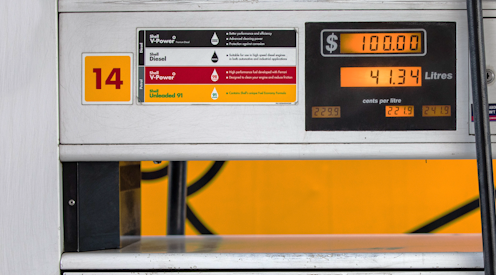What is petrol excise, and why does Australia have it anyway?
- Written by John Freebairn, Professor, Department of Economics, The University of Melbourne

One government, in New Zealand[1], has already cut its fuel excise, by 25 cents per litre for the three months it hopes will be the worst of the oil price crisis, and in the United States[2] and Australia[3] there’s talk of the same sort of thing.
Before considering whether it should be cut, temporally waived, or removed in this month’s budget, it’s worth reacquainting ourselves with what it is.
As is the case with the goods and services tax, it isn’t explicitly quoted when we buy petrol or other fuels; it is rolled into the advertised price.
At the moment the excise on standard unleaded petrol is 43.3 cents per litre[4], an impost which itself is subject to the goods and services tax. This brings the total to 47.6 cents per litre, something that would have been significant a year ago when the price of petrol was lower, accounting for one third of the price.
It is now less important, accounting for 22% of the price of petrol.
The fuel excise is imposed by the Commonwealth government. As a matter of law and as required by the Constitution[5], all revenue raised by the Commonwealth goes into “one consolidated revenue fund”. But from 1926 to 1959 all or part of the fuel excise was earmarked[6] for spending on roads.
Since then, it has generally been available for any sort of spending – although the impression remains that it is a crude form of user fee for roads and associated government-funded infrastructure, and for maintenance of that infrastructure.
Effectively a road user charge
The excise is collected at the points of distribution from local refineries and importers rather than at the petrol pump, making it easy to administer.
Making it much more difficult to administer are the substantial rebates[7] offered to off-road users of petrol and diesel, which have the effect of making it a charge for using roads. They cut the total takings from about A$20 billion[8] to A$11 billion[9].
State and territory governments impose another set of taxes on the use of motor vehicles. These include stamp duty on the registration, annual registration fees, the charge for drivers licenses, and taxes on vehicle insurance. State taxes on the use of motor vehicles amounted to A$11.3 billion[10] in 2019-20.
Read more: It's hard to find a case for a cut in petrol tax – there are other things the budget can do[11]
These taxes also go into general revenue, and with no specific link to state government decisions on road infrastructure and maintenance or the provision of services such as traffic police and hospitals.
Taken together, the Commonwealth’s takings from fuel excise and the states’ takings from special motor vehicle taxes appear to roughly equal[12] their spending on roads and associated infrastructure and fall short of the total costs imposed by road users on others including the costs of noise, pollution and policing.
There are better ways to do it
In an ideal world we would charge explicitly for road use, pollution and congestion in the cities during peak hours.
Fuel excise is an increasingly inappropriate way of charging for road use because more and more cars (including hybrids) are using less fuel per kilometre, and some (including all-electric vehicles) are using none.
Some states, including Victoria, charge electric vehicles per kilometre travelled. Owners are required to provide a photo of their odometer and the fee is added to the cost of their registration[13].
While in the spirit of user charging, what Victoria and other states are doing is a limited first step.
Read more https://theconversation.com/what-is-petrol-excise-and-why-does-australia-have-it-anyway-179373

















